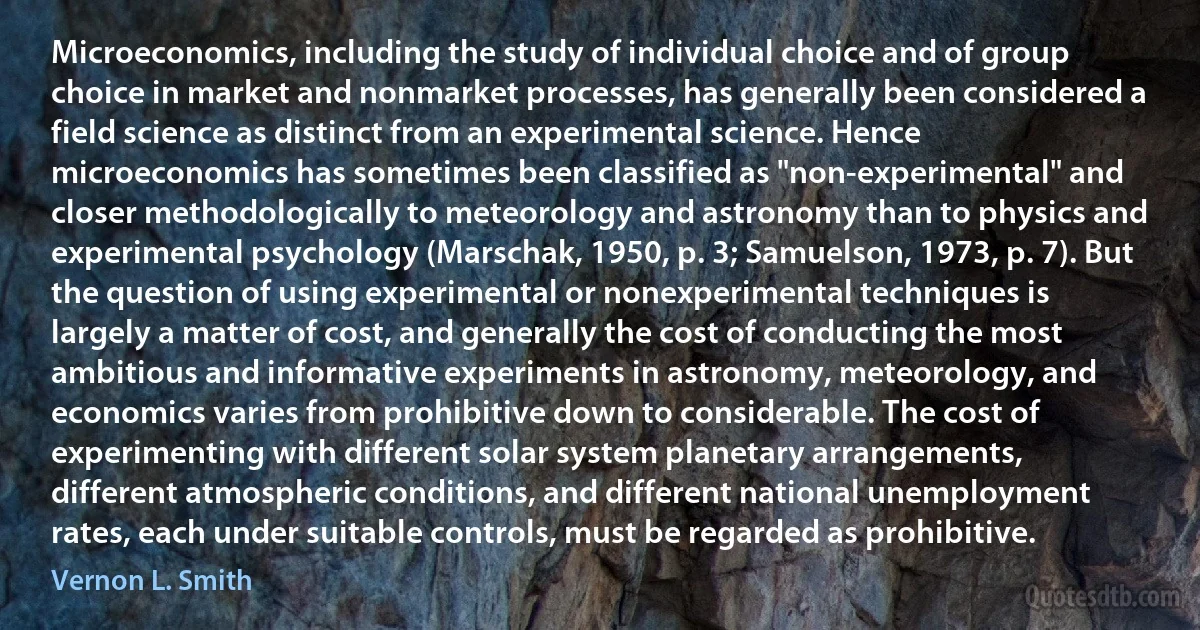
Microeconomics, including the study of individual choice and of group choice in market and nonmarket processes, has generally been considered a field science as distinct from an experimental science. Hence microeconomics has sometimes been classified as "non-experimental" and closer methodologically to meteorology and astronomy than to physics and experimental psychology (Marschak, 1950, p. 3; Samuelson, 1973, p. 7). But the question of using experimental or nonexperimental techniques is largely a matter of cost, and generally the cost of conducting the most ambitious and informative experiments in astronomy, meteorology, and economics varies from prohibitive down to considerable. The cost of experimenting with different solar system planetary arrangements, different atmospheric conditions, and different national unemployment rates, each under suitable controls, must be regarded as prohibitive.
Vernon L. SmithRelated topics
astronomy choice classified closer conducting cost different economics experimental field market matter meteorology national planetary psychology question science solar study under using microeconomicsRelated quotes
The whole economic system of Capitalism is an offshoot of a devouring and overwhelming lust, of a kind that can hold sway only in a society that has deliberately renounced the Christian asceticism and turned away from Heaven to give itself over exclusively to earthly gratifications. ... It is the result of a secularization of economic life, and by it the hierarchical subordination of the material to the spiritual is inverted. The autonomy of economics has ended in their dominating the whole life of human societies: the worship of Mammon has become the determining force of the age. And the worst of it is that this undisguised "mammonism” is regarded as a very good thing, an attainment to the knowledge of truth and a release from illusions. Economic materialism formulates this to perfection when it brands the whole spiritual life of man as a deception and a dream.

Nikolai Berdyaev
They were now as a party engaged in carrying laboriously uphill the last few columns out of the Gladstonian quarry. ... Foremost among the tasks of Liberalism in the near future was the regeneration of rural life and the emancipation of the land of this country from the paralysing grip of an effete and unprofitable system. ... [The reports into rural life] were startling. When they were published they would prove conclusively that there were hundreds of thousands, if not millions, of men, women, and children dependent upon the land in this country and engaged in cultivating it, hardworking men and women, who were living under conditions with regard to wages, to housing, as well as hours of labour-conditions which ought to make this great Empire hang its head in shame that such things could be permitted to happen in any corner of its vast dominions, let alone in this country, the centre and source of all its glory.

David Lloyd George
Japan had come to terms with Russia because of her difficulties, but this did not mean approval of communism. Communism meant the end of emperor-worship, and feudalism and the exploitation of the masses by the ruling class, and indeed almost everything that the existing order stood for... But communism is the outcome of widespread misery due to social conditions, and unless these conditions are improved, mere repression can be no remedy. There is a terrible misery in Japan at present. The peasantry, as in China and India, are crushed under a tremendous burden of debt. Taxation, especially because of heavy military expenditure and war needs, is very heavy. Reports come of starving peasants trying to live on grass and roots, and of selling even their children. The middle classes are also in a bad way owing to unemployment and suicides have increased.

Jawaharlal Nehru
Among the various paradigmatic changes in science and mathematics in this century, one such change concerns the concept of uncertainty. In science, this change has been manifested by a gradual transition from the traditional view, which insists that uncertainty is undesirable in science and should be avoided by all possible means, to an alternative view, which is tolerant of uncertainty and insists that science cannot avoid it. According to the traditional view, science should strive for certainty in all its manifestations (precision, specificity, sharpness, consistency, etc.); hence, uncertainty (imprecision, nonspecificity, vagueness, inconsistency, etc.) is regarded as unscientific. According to the alternative (or modem) view, uncertainty is considered essential to science; it is not only an unavoidable plague, but it has, in fact, a great utility.

George Klir
Unfortunately... the philosophy of Aristotle laid it down as a principle, that the celestial motions were regulated by laws proper to themselves, and bearing no affinity to those which prevail on earth. By thus drawing a broad and impassable line of separation between celestial and terrestrial mechanics, it placed the former altogether out of the pale of experimental research, while it at the same time impeded the progress of the latter by the assumption of principles respecting natural and unnatural motions, hastily adopted from the most superficial and cursory and remark, undeserving even the name of observation. Astronomy therefore continued for ages a science of mere record, in which theory had no part, except in so far as it attempted to conciliate the inequalities of the celestial motions with that assumed law of uniform circular revolution which was alone considered consistent with the perfection of the heavenly mechanism.

John Herschel
